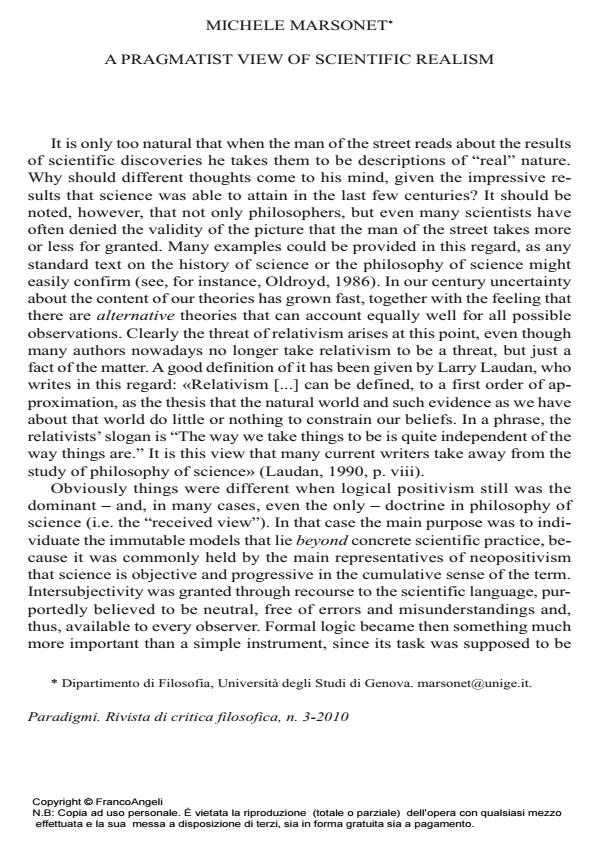A Pragmatist View of Scientific Realism
Titolo Rivista PARADIGMI
Autori/Curatori Michele Marsonet
Anno di pubblicazione 2010 Fascicolo 2010/3
Lingua Inglese Numero pagine 8 P. 89-96 Dimensione file 270 KB
DOI 10.3280/PARA2010-003007
Il DOI è il codice a barre della proprietà intellettuale: per saperne di più
clicca qui
Qui sotto puoi vedere in anteprima la prima pagina di questo articolo.
Se questo articolo ti interessa, lo puoi acquistare (e scaricare in formato pdf) seguendo le facili indicazioni per acquistare il download credit. Acquista Download Credits per scaricare questo Articolo in formato PDF

FrancoAngeli è membro della Publishers International Linking Association, Inc (PILA)associazione indipendente e non profit per facilitare (attraverso i servizi tecnologici implementati da CrossRef.org) l’accesso degli studiosi ai contenuti digitali nelle pubblicazioni professionali e scientifiche
Scientific realism is a theme in which the originality of pragmatist positions clearly emerges. Nicholas Rescher argues that natural science can indeed validate a plausible commitment to the actual existence of its theoretical entities. Scientific conceptions aim at what really exists in the world but only hits it imperfectly and "well off the mark". Rescher’s aim is to replace Charles S. Peirce’s "long-run convergence" theory of scientific progress with a more modest position geared to increasing success in scientific applications, especially in matters of prediction and control. We can never assume that a particular scientific theory gives us the true picture of reality, since we know perfectly well from the history of science that, in a future we cannot actually foresee, it will be replaced by a better theory. There is indeed no reason to think that our particular scientific outlook on reality is absolute from the cognitive viewpoint. It must be relativized because of the interaction between the world on the one hand and human beings who investigate it on the other. Both our input and Nature’s play a fundamental role in the outcome of our investigation.
Il realismo scientifico è un tema in cui emerge chiaramente l’originalità della posizione pragmatista. Nicholas Rescher, per esempio, sostiene che la scienza possa plausibilmente impegnarsi con l’esistenza effettiva delle sue entità teoretiche, ma le concezioni scientifiche ci arrivano solo parzialmente e "ben lungi dalla perfezione". L’idea di Rescher è di sostituire la teoria peirceana della "convergenza alla lunga" come spiegazione del progresso scientifico con una posizione più modesta intesa ad accrescere il successo delle applicazioni scientifiche, specialmente per quanto riguarda la predizione e il controllo. Non possiamo mai assumere che una certa teoria scientifica ci dia la vera immagine della realtà, visto che dalla storia della scienza sappiamo perfettamente bene che in un futuro per noi imprevedibile essa sarà rimpiazzata da una teoria migliore. Non c’è ragione di pensare che la nostra particolare prospettiva scientifica sia assoluta da un punto di vista cognitivo perché dobbiamo relativizzarla secondo l’interazione con il mondo da un lato e con gli esseri umani che la investigano dall’altro.
Parole chiave:Fallibilismo, Interazione, Realismo scientifico, Relativismo, Rescher
Michele Marsonet, A Pragmatist View of Scientific Realism in "PARADIGMI" 3/2010, pp 89-96, DOI: 10.3280/PARA2010-003007